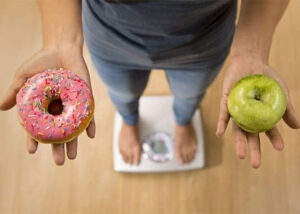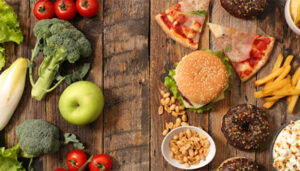Jalebis, Rasgullas, sweet curds, Rum cake. Festival delicacies might differ by the region and culture it originates from. But, food temptations are everywhere, and it can continue for weeks on end! Over the course of the festival season, you may gain 2-3 kg by consuming just 200 extra calories per day over 2-3 weeks.
A couple of jalebis daily after meals or a slice of cheesecake. A few scoops of ice cream here or the usual salty and savory snacks there. Few lose this weight during the following months and years, without concreted effort.

.
You don’t have to starve yourself or consume bland foods. Instead, with the help of some defensive cooking and eating techniques, you can indulge in delicacies without the guilt. Here are 7 tips to help you achieve that:
- Pause before taking seconds– Before taking a second serving, count to ten (minutes, not seconds). The “I’m getting full” signal from your stomach takes some time to reach your brain. Take a 10-minute rest after you’ve finished your first helping. Strike a conversation with a family member. Take a sip of water. Reassess your hunger after that. You might realize that you are full, and don’t need more food.
- Don’t leave home on an empty stomach– Eat something before leaving for the party so you don’t end up with a ravenous appetite on reaching there. A slice of fruit, multigrain bread with peanut butter, a handful of dry fruits or a few spoons of non sweetened yogurt are excellent pre-party snacks. These snacks are a healthy mix of long lasting complex carbohydrates, protein, and unsaturated fat. You will avoid bringing on those sugar and fat rich options at the party table.

- While cooking, use substitutes! Swap ingredients or revise your recipes to improve the nutritional value of your holiday dishes. Use avocado puree or
cashew nut butter instead of regular animal-sourced butter, for your Christmas cakes and pastries. Use whole wheat flour or gram flour (besan) instead of
Maida (refined flour) while making sweets for Diwali. Use fresh ingredients rather than processed store-bought options while planning festive meals. Cooking with home-made ingredients might not always be easy, but is well worth the effort, if eating healthy is a priority for your family.

- Fit in your favorite food first– Who doesn’t have food priorities? Any Indian teenager would stuff his/her plate with biryani, rather than a vegetable salad.
During the holidays, the plentiful food options can confuse even the most level-headed eater. Pick the foods you relish most. Prefer the food that is only
available during the particular season, such as your dadi’s rose cookies, that get made only before Christmas. Savor a small serving first, before piling on the
staples. Sometimes the best way to deal with food temptation is to give in to a certain extent.
5. Schedule Exercise – Most of us end up researching every detail of our planned vacation. We do all the necessary online research, to ensure our family  has the best time possible. Whether it’s flight or train connections, places to see or restaurants to visit, some of us do not leave a stone unturned. Schedule time for enjoyable exercise, just like you would for a holiday activity with your family.
has the best time possible. Whether it’s flight or train connections, places to see or restaurants to visit, some of us do not leave a stone unturned. Schedule time for enjoyable exercise, just like you would for a holiday activity with your family.
Set a reminder on your phone and wake up early. Get some fresh air by going outside, or stay inside and hit the gym. Being physically active is your secret holiday weapon!
6.Sleep enough – Holiday trips, late night parties, movie sessions and a house bustling with relatives. There are enough reasons to sleep less during the holiday season. Losing sleep can make it more difficult to control your blood sugar if you are diabetic. 
According to recent research, a lack of sleep has been found to trigger changes in certain appetite hormone levels. This imbalance leads to increased hunger and appetite. Stressed and sleep deprived people tend to consume more food. They also favor foods heavy in fat and sugar. To avoid mindless eating, aim for 7 to 8 hours of good quality sleep each night.
- Drink enough water– Many people end up eating, when they actually are thirsty. Signs of mild dehydration, such as headache, weariness, dizziness, and difficulty focusing, can resemble hunger. It is simple to ignore — and eventually get confused between hunger and thirst due to round the clock availability of food and drink. The festival season also results in many social situations that favor excessive eating and drinking. The next time you feel hungry a little earlier than usual, drink a glass of water, and wait to see if the ‘hunger-pangs’ are still around.
Above all, keep in mind what the holiday is all about: enjoying and spending time with the people you cherish. It’s simpler to pay less attention to the food when you concentrate more on the fun and family

